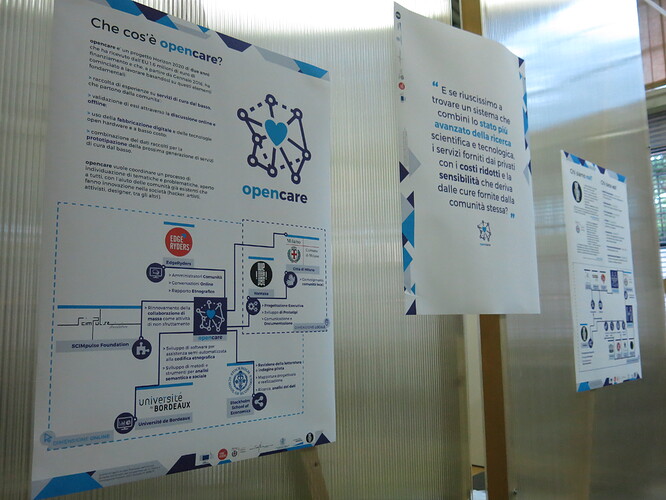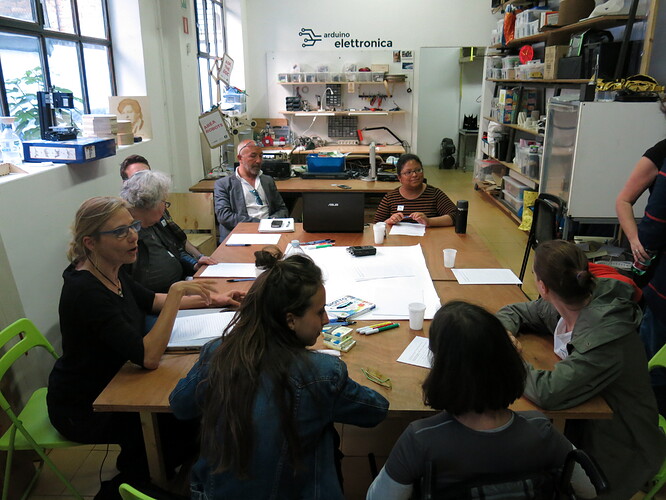report | LOCAL ACTIVITY | CO-DESIGN (FIRST SESSION)
May, 4th 2016
, 6 p.m. - 9.30 p.m
WeMake, via Stefanardo da Vimercate 27/5, Milano<span style='mso-bidi-font-size:10.0pt;
font-family:Times;mso-bidi-font-family:“Times New Roman”;mso-fareast-language:
IT’>
LET’S START FROM CITIZENS/COMMUNITIES TO FIND PRACTICAL SOLUTIONS TO SPECIFIC HEALTH CARE NEEDS
General concept
As a result of the changing role of the State in providing welfare benefits, local governments are testing new models of welfare policy related with productive and civil economy clusters able to generate an advanced community welfare services.
Since 2014 the City of Milan is making a structured attempt to progressively re-design care services in a more sustainable way, taking advantage of the scattered knowledge produced by individuals and local communities, and enhancing and sharing it to improve the wellbeing of others in their communities.
Thanks to Opencare, during these months the Municipality of Milan and WeMake met groups of citizens and collaborative communities to start engaging them in Opencare.
Today we are going to do the first co-design session, which will have as participants’ people previously engaged.
The whole Co-design flow (Timing):
- collect experiences of community-driven care services
- validate them through open discussion, both online and offline
- augment them with state-of-the-art maker technology (3D printing, laser cutting, biohacking…)
- combine everything we learn into the design and prototype of next generation community driven care services.
Who should participate?
In previous meetings with Milanese communities and workshops, Comune di Milano and WeMake have met people who has shown to be curious and wishful to take oneself a challenge. They will be invited to co-design sessions.
Moreover, co-design meeting will be open to everyone (registration required) and also people from the community of WeMake will participate to the activity.
Program Schedule
First Session | Wednesday, May 4th, 2016 | 6 p.m. - 9.30 p.m
Second Session | Wednesday, May 11th, 2016 | 6 p.m. - 9.30 p.m
Third Session | TBD, june 2016
All the sessions will be hosted by WeMake
First meeting |Wednesday, May 4th, 2016 | 6 p.m. - 9.30 p.m
Opencare staff:
Gisella Bassanini (Architect, Facilitator)
Costantino Bongiorno, Roberta Ribero, Alessandro Contini, Chiara Ferrero, Silvia D’Ambrosio (WeMake)
Rossana Torri; Alberto Simonetti, Annacristina Siragusa (Comune di Milano)
Andrea Balossi - video operator
Specific attention paid to “ethical considerations”:
Participation was voluntary. The Opencare team have carefully explained rules and privacy implications for participants, which gave consent for the treatment of their data and anonymously sharing their stories on the web. Participants have been asked to sign a consent form well-prepared and shared with Marco Manca, Scimpulse.
The collected data and information coming from the discussion will be treated confidentially and will be not linked to any named person.
Working method:
Participants have worked in small groups. One facilitator has assisted each group, in order to create an environment for effective communication, keep discussion focused, keep people engaged, provide opportunities to all voices to be heard.
Audio and video of the meeting has been integrally recorded.
What we asked participants to do:
- to focus on one or at most two practical needs in the sphere of daily care activities;
- to “validate” them through a group discussion and choose one for each group;
- to present the concept of the selected need in a plenary session.
WELCOME AND INTRO (6.15 TO 6.45)
Rossana - City of Milan: Opencare approach, partnership, goals
Alessandro Contini - WeMake: Examples of community-based solutions
Costantino Bongiorno - WeMake: Co-design process at whole and single steps
As usual, when the practical examples are presented people start to understand better the project and to interact, also commenting the cases. The Edna’s case (clip) seems to be inspiring.
When Costantino talks about the different working groups, the man in wheelchair comments in an ironical way that he cannot go upstairs to work.
Talking about personal examples can be a good way to engage the audience: if participants see that you open yourself, they will feel more comfortable to open themselves as well.
An old lady asked to use only Italian words (“plug in” is avoided). She is very proactive.
GROUPWORK (6.45 TO 8.00 PM)
3 groups with altogether 27 participants (15 women and 12 men) joined the co-design session. The groups have been pre-formed in order to ensure a balance of genders, age and background.
The groups were called “Hammer”, “Pincer”, “Screwdriver”, to evoke object’s most common use in a manufacture. Each participant received a sticker to mark the affiliation to a specific group.
The reaction of people after receiving the sticker was really good, as they showed appreciation to have a role (they said “Ah! We are in the same group, cool!”). The grouping of people seemed to be like a head count in school, and participants were looking forward to start working. It appears that they like the idea of working with new people.
The tools:
Instant Report Sheet
At the start of the session, each person received a pen and a paper with plenty of space to answer to the question: “Please, describe one (at most two) needs/obstacles related to daily care activities and/or the need for care for affected family member(s)”, eventually suggesting solutions you have already attempted”
This phase lasted 10 minutes.
We adapted the Open Space Technology (OST), as suggested by Gisella, in order to have the possibility of creating instant proceedings of the session.
Because the participants are not equipped with PCs, hand-written sheets have been fully transcribed.
These are collected in an “Instant book” of the session.
The original “stories” will be posted on the Opencare Platform as “Challenges”
Explanation of the tools, and they are immediately starting thinking about the possible need that they have. Most of them have difficulties to think about a need, so they stay for a while looking at the paper.
Participant with “physical” disabilities discusses with her tutors/friends about their possible need. A man, after finishing writing, clicks the pen on the paper and breathes in a satisfied way.
Group discussion:
Participants have been then asked to discuss their individual issues with the group.
The purpose of the discussion is to share and select one (at most two) individual needs/obstacles to be submitted to the plenary.
Three to six of the emerging problems will be the subjects of the next co-design session, which aims at the co-design of feasible solutions.
Plenary restitution:
The groups have presented at the plenary session their arguments, summarized through a slogan, a description of the need/obstacle, and a "target population”.
- No sbatti (don't’ fucking crash) - The autonomy is better if it is outside, so is strongly related to accessibility/mobility. A big problem is therefore that of the physical barriers that prevent those who are not entirely autonomous to move around the city freely and safely.
- Stai Sciallo (Take it easy) – represents the need to recognize panic attacks and something that can help to face them.
- “Mezzo vuoto, mezzo pieno” (Half full, half empty) – represents the need of something that can prevent throwing things in toilets, but can help Muslims to wash themselves (as the Islamic faith has particular rules regarding personal hygiene when going to the toilet).
- “OPS” (Need help): People suffering from epilepsy and sometime have seizures, run the risk of falling down or become confused/only partly aware of what is happening around them. Surroundings could be a safety risk.
- “Let's share information and good practices to support autonomy”. Autonomy concerns both the private and the public dimension. A big issue is the lack of interconnection and sharing of information and expertise.
The co-design second session will start from this point to develop possible solutions to prototype.

